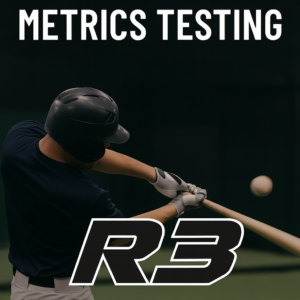Baseball & Softball Metrics Testing | Exit Velocity, Throwing Velocity, Agility | R3 Holtsville NY
 Why Baseball & Softball Athletes Need Metric Testing to Reach Their Goals
Why Baseball & Softball Athletes Need Metric Testing to Reach Their Goals
In today’s game, numbers matter. College coaches, scouts, and recruiters want more than just highlights and game stats — they want hard data. For baseball and softball players, recorded metrics like throwing velocity, 5-10-5 agility times, exit velocity, and sprint speed are critical for measuring development and showcasing athletic potential.
That’s why having your athlete properly tested and tracked is one of the smartest steps you can take to keep them on the path toward success.
What Are Baseball & Softball Metrics?
Athlete performance metrics are standardized data points that evaluate a player’s skill, athleticism, and progress. The most common include:
-
Throwing Velocity – How hard an athlete can throw, measured with a radar gun.
-
Exit Velocity – The speed of the ball off the bat, a key indicator of hitting power.
-
5-10-5 Agility Time – Measures lateral quickness and change of direction, important for both offense and defense.
-
60-Yard Dash / Sprint Speed – Assesses speed and explosiveness.
-
Pop Time (Catchers) – The time it takes to throw down to second base.
These numbers provide a clear, unbiased picture of where an athlete currently stands.
Why Metrics Testing Is Important
1. Keeps Athletes on Track
Consistent testing shows whether training is paying off. By tracking metrics every few months, athletes and coaches can measure progress and adjust training plans.
2. Sets Clear Goals
Instead of guessing, athletes know exactly what benchmarks they need to hit to compete at higher levels. For example, a high school shortstop aiming for college baseball might target an 85+ mph throwing velocity and a 7.0 or faster 60-yard dash.
3. Boosts Motivation
Nothing inspires athletes like seeing measurable improvement. Going from a 68 mph exit velocity to 75 mph in a few months proves the work is paying off.
4. Helps With Recruiting
Metrics are now a critical part of college recruiting profiles and scouting reports. Coaches want data because it provides an apples-to-apples comparison across athletes from different regions. Having verified numbers gives your athlete credibility and visibility.
5. Prevents Guesswork
Without data, athletes and parents are left with opinions: “He looks fast” or “She has power.” With metrics, you know exactly where your athlete stands.
Why R3 Athlete Performance Is the Place to Test
At R3 Athlete Performance in Holtsville, NY, we specialize in baseball and softball metric testing for athletes across Farmingville, Nesconset, Ronkonkoma, Hauppauge, Patchogue, and all of Suffolk County.
Our testing combines professional-grade equipment with expert evaluation to provide accurate, actionable results. Each athlete receives:
-
Verified data on throwing velocity, exit velocity, speed, and agility.
-
Benchmark comparisons to age and competition level.
-
Insights from instructors on how to improve weaker areas.
-
Records that can be shared on recruiting platforms and with college coaches.
We don’t just record numbers — we use them to help athletes get 1% better every day.
The Bottom Line for Parents & Athletes
If your child is serious about playing baseball or softball at the next level, metric testing isn’t optional — it’s essential.
✔️ It provides a roadmap for development.
✔️ It sets measurable, realistic goals.
✔️ It creates accountability in training.
✔️ It makes recruiting profiles stronger and more credible.
Don’t leave your athlete’s future to guesswork. Give them the competitive edge by recording and tracking the numbers that matter.
👉 Ready to test your metrics?
Signup your athlete for our next Official Prospect Metric Testing Event at R3 Athlete Performance in Holtsville, NY and start turning raw data into real results.
